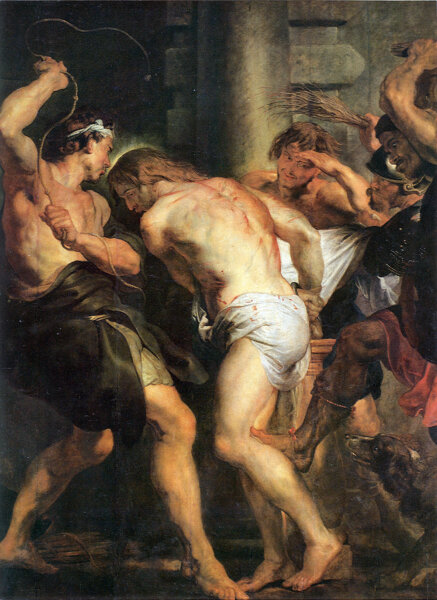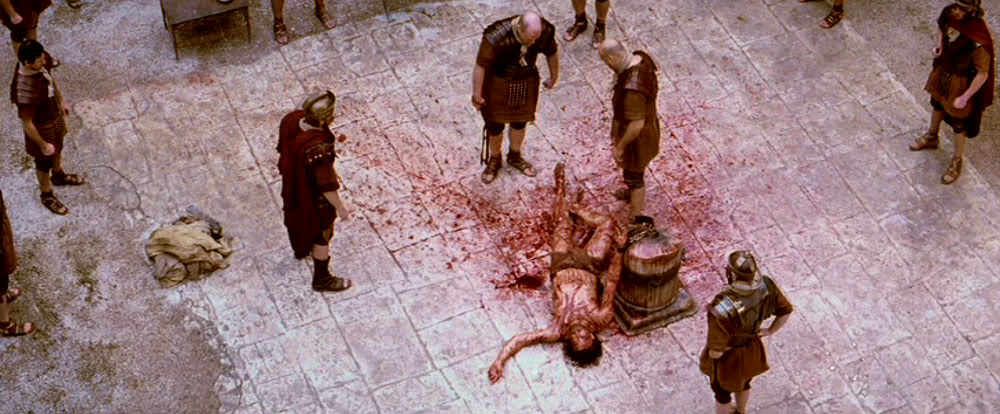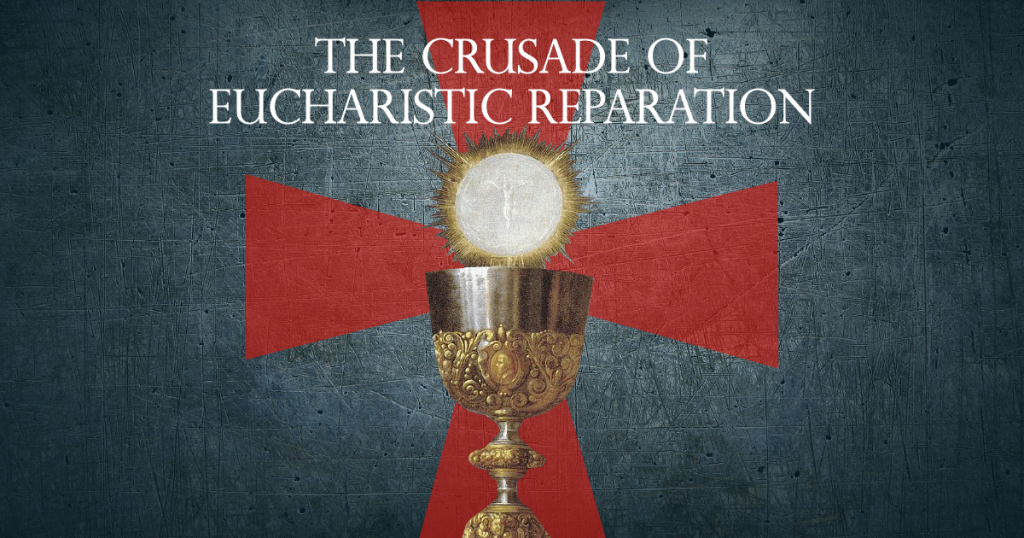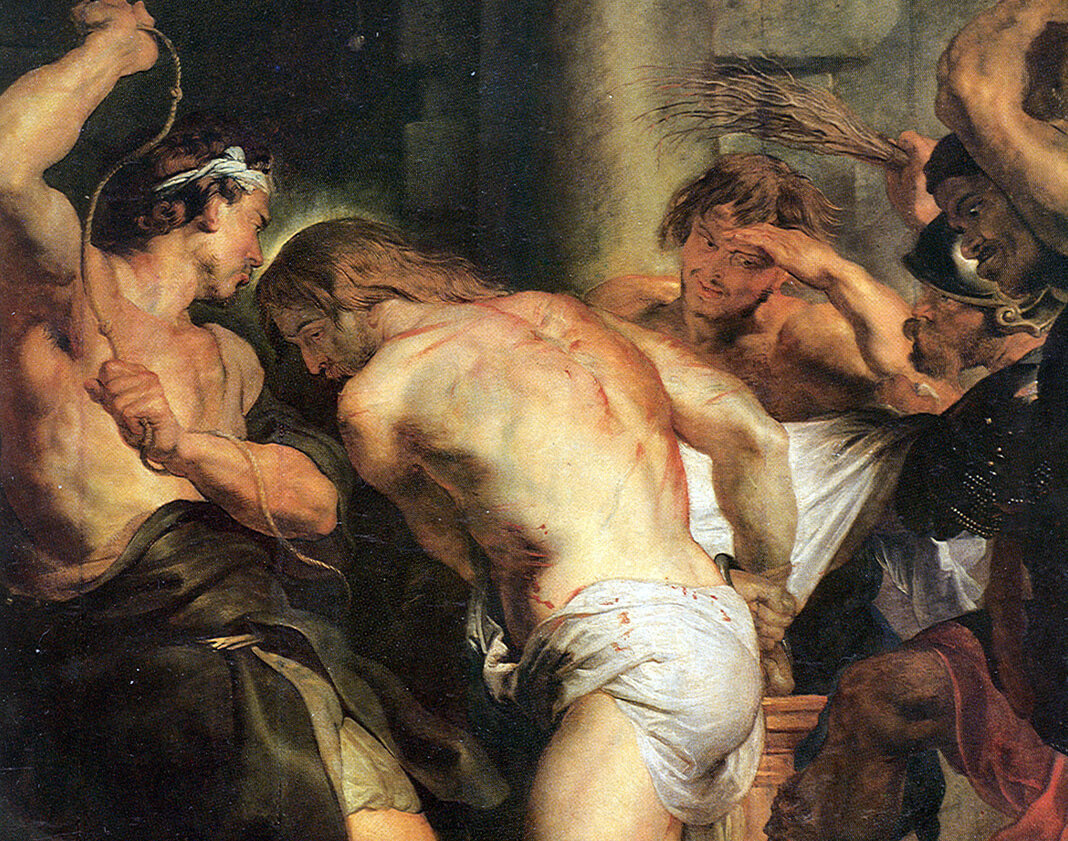
The Passion of Christ in the Blessed Sacrament
When one sees sacrilege against the Holy of Holies; when one sees the faithful take Holy Communion in their hand (in a Protestant manner) and scatter Particles of His Body to be trampled or other liturgical abuses, the pious soul is deeply grieved in heart. We may feel anger at the clerics or faithful abusing Our Lord. (“Father forgive them for they know not what they do!”) We may feel despair that so few still believe in this precious dogma of our faith, the Real Presence, attacked for five centuries by heretics.
If we dwell on feelings such as these too much, we might be overwhelmed in our spirits, affecting our prayers lives, and, God forbid, our own faith.
Therefore I want to suggest another object of meditation for this crusade. This is contained in His Excellency’s original call for this crusade, when he provides this quotation from St. Peter Julian Eymard:
By instituting His Sacrament, Jesus perpetuated the sacrifices of His Passion. … He was acquainted with all the new Judases; He counted them among His own, among His well-beloved children. But nothing of all this could stop Him; He wanted His love to go further than the ingratitude and malice of man; He wanted to outlive man’s sacrilegious malice.
He knew beforehand the lukewarmness of His followers: He knew mine; He knew what little fruit we would derive from Holy Communion. But He wanted to love just the same, to love more than He was loved, more than man could make return for.[1]
Our Lord would rather continue His Passion on earth – by the sacrileges He suffers in the Most Blessed Sacrament – than remove His true presence from among His faithful. He is the Divine Bridegroom, Who has espoused His Mystical Bride, the Church, and will not leave her no matter what she does. I will espouse thee to me forever (Os. ii. 19).[2]
Here we are confronted with the infinite love of Christ in the Blessed Sacrament, ready to endure all things rather than leave us all alone. Here I am reminded of Fr. Ignatius of the Side of Jesus when he reflects on the scourging:
The force of love alone is sufficient to bind Him to that pillar, ready and willing to submit to the scourges, and to shed every drop of His Blood. O Beloved Son of God! I thank Thee for such infinite charity![3]

In the same way the “force of love” – that mystical marriage bond with His Church – binds Our Blessed Lord to the Tabernacle, to the Altar, never to leave us, nor forsake us, sinners. Behold I am with you all days, even to the consummation of the world (Mt. xxviii. 20).
Come, Partake of the Passion of Christ
Therefore we join in this Passion of Our Lord, and take upon ourselves the penance to make reparation for ourselves and our brothers’ sins. The Catholic response to public sin is to do penance for the sinner. This is essential for three reasons:
1.) it gives God the glory due to Him, which was taken away by sin;
2.) it appeases His wrath against the sinner, and merits graces for his conversion; and
3.) it helps us to keep us from sins of hatred against our brother or abusive spiritual fathers.
This last reason helps us to truly pray the Our Father from the heart: forgive us our trespasses as we forgive those who trespass against us and obey the admonition of Our Lord after He instituted the Lord’s Prayer: But if you will not forgive men, neither will your Father forgive you your offences (Mt. vi. 15).
This is the hardest part, but grace can make what is impossible for man possible with God. All that is needed is contained in the Body, Blood, Soul and Divinity of Our Lord Jesus Christ. Let us consider our souls and the love of God, and bind ourselves to the Pillar with Christ’s force of love.
Join the Crusade of Reparation
I wholeheartedly support and bless this necessary and very important lay initiative for eucharistic revival in the Church of our day.
-Bishop Athanasius Schneider

The Crusade of Eucharistic Reparation is a lay sodality run by OnePeterFive in partnership with Benedictus and Mass of the Ages.
Intentions of this Crusade
- To make reparation to God for the sins committed against the Blessed Sacrament
- The restoration of the Latin Mass in the Church.
Requirements
- One hour Adoration per month in reparation for the sins committed against the Blessed Sacrament.
- Pray at least once per month the Prayer of the Crusade of Reparation to the Eucharistic Heart of Jesus written by Bishop Athanasius Schneider
Additional Devotions (Optional)
- Become a “Custos Traditionis” by praying the Memorare daily with weekly penance for the reversal of Traditionis Custodes.
- Be invested with the Crusader Cross using Bishop Schneider’s approved rite of blessing.
- Offer a weekly or even a daily Holy Hour in reparation for the same ends.
Additional Efforts of the Crusade (Optional)
- Read and share the articles and reflections we have published on this topic.
- Share the Mass of the Ages Documentary series (Episode I, Episode II).
- Share Benedictus, the traditional Catholic companion.
- Promote, plan and execute a weekly, monthly, and/or annual reparation Mass and devotions in your parish and diocese. His Excellency suggests a “Day of Reparation for Crimes Against the Most Holy Eucharist” in each diocese as the octave day of Corpus Christi.
- Gather a group in your parish or diocese to pray regularly these prayers for your bishop to restore the Latin Mass in your diocese and root our liturgical abuses and sacrileges.
- Read and share Kwasniewski’s manifesto of Eucharistic Reparation: Holy Bread of Eternal Life: Restoring Eucharistic Reverence in an Age of Impiety
- Read Bishop Laise’s treatise against Communion in Hand (Holy Communion), and His Excellency’s Dominus Est and buy all these books for priests and bishops.
[ninja_form id=2]
T. S. Flanders
Editor
Holy Thursday
[1] Peter Julian Eymard, The Real Presence, 29. The Most Blessed Sacrament is not Loved!, III.
[2] This is what we previously reflected upon in our essays on Pornocracy (here and here).
[3] Fr. Ignatius, School of Jesus Crucified, day XVI.


